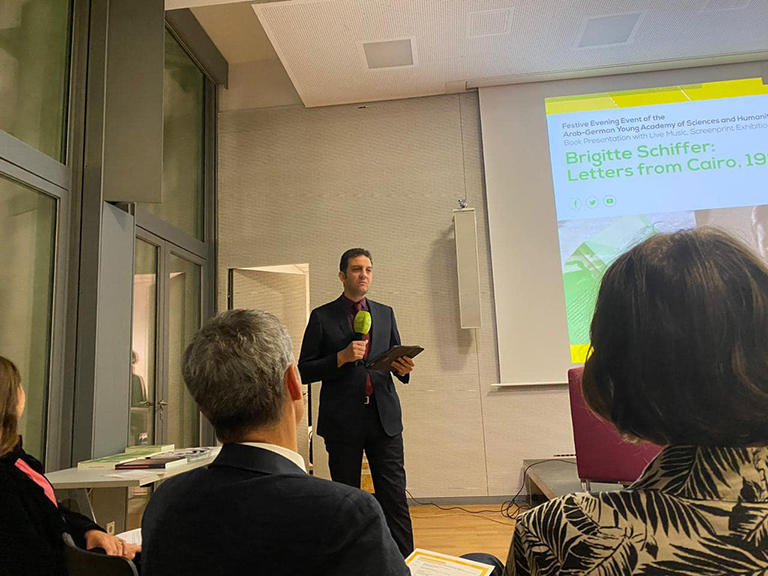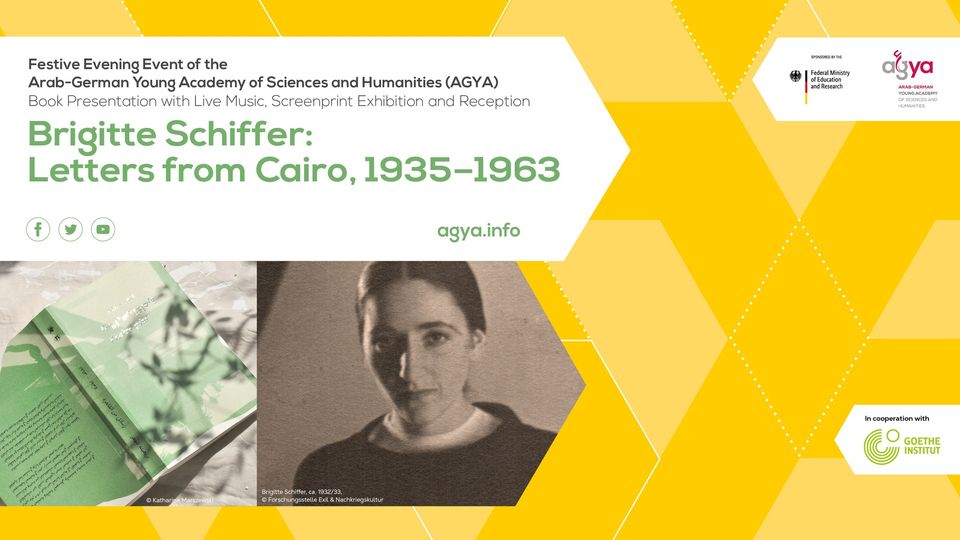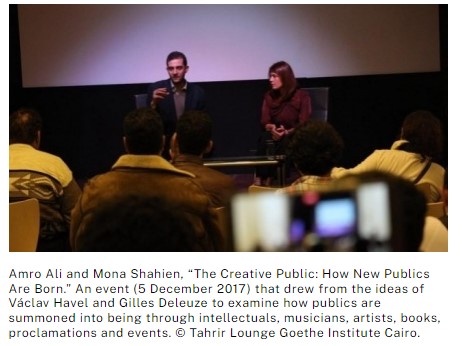It was an honour to launch the book event ‘Brigitte Schiffer: Letters from Cairo, 1935–1963,’ authored by Dörte Schmidt and Matthias Pasdzierny. They discussed the fascinating life of Brigitte Schiffer, a Jewish-German woman who fled Nazi Germany in 1935 and found refuge in Cairo and, among other achievements, documented the musical traditions of Siwa which were played at the event through a string quartet.
Date: 6 pm, 23rd November 2022
Venue: Goethe Cairo
عمرو علي.. الفلسفة أم العلوم.. وأحاديث المقاهي و”أجنحة إيكاروس” جزء من تبسيطها
وُلد “علي” في الإسكندرية.. ونشأ في أبعد مدينة على وجه الأرض.. وأدمن الترحال بين برلين والدار البيضاء والقاهرة مؤمنًا بأهمية توصيل الفلسفة إلى عموم الجمهور
The writer Hany Zaied at the Scientific American magazine (Arabic edition) interviewed me through a photo essay on my academic life and how the tyranny of distance (Australia to Egypt) shapes one’s work, the role of bridging academia with the public, readapting sociology and philosophy into local contexts, why humanities and the liberal arts need to be made easily accessible to the public and made compulsory on the university level in the Arab world, and the importance of spaces and platforms such as AGYA, AUC, and FU. As well as why cities like Alexandria, Berlin, and Casablanca inform my activities.
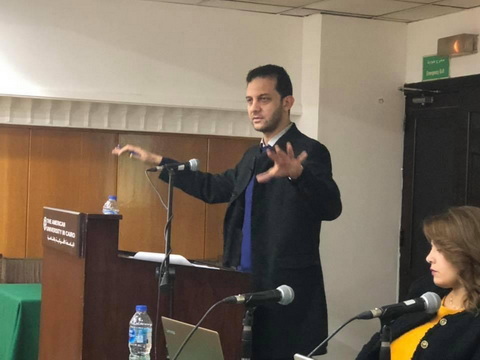
تحكي الأسطورة اليونانية القديمة قصة “إيكاروس”، الذي احتجزه ملك جزيرة “كريت” –ومعه والده- في متاهة لم ينجحا في الهرب منها إلا بعد الاستعانة بأجنحة ثبَّتاها على جسديهما بالشمع، لكن “إيكاروس” –المستمتع بلذة تحدِّي قوانين البشر والطبيعة- رفض نصيحة والده بالابتعاد عن الشمس التي أذابت الشمع وجعلته يسقط صريعًا.
ظن “إيكاروس” نفسه إلهًا، متناسيًا وجود حدود فاصلة لا يمكن تخطِّيها بين البشر والإله! فالشمس التي اقترب منها تمثل الحقيقة والمعرفة، والاقتراب منها يحتاج إلى سؤال النفس عن عواقب الاقتراب من لهيبها، فهل يمكن أن تتحول أسطورة “إيكاروس” إلى مدخل لتبسيط الفلسفة؟ وهل يمكن أن تتحول صورة قديمة لامرأة في المحطة تنتظر القطار إلى مدخل لفهم الفلسفة؟
تلك الأسئلة وغيرها –على بساطتها- اختارها الدكتور عمرو علي -عالِم الاجتماع، وعضو الأكاديمية العربية الألمانية للباحثين الشباب في العلوم والإنسانيات، والزميل الزائر في برنامج “أوروبا في الشرق الأوسط- الشرق الأوسط في أوروبا” في منتدى الدراسات العابرة للأقطار في برلين- مدخلًا لتقديم الفلسفة وعلم الاجتماع للجمهور العربي بطريقة عملية ومفهومة.
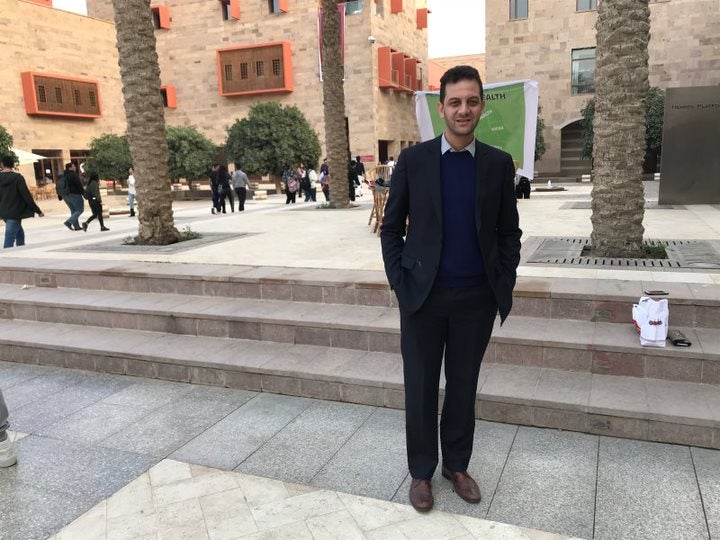
يشبه “علي” علم الاجتماع بنظارة شمسية توفر الظل الذي يكشف تدرجات الموضوع الفلسفي وتلاوينه
نال “علي” درجة الدكتوراة من جامعة سيدني الأسترالية، وتناولت أطروحته دور الخيال التاريخي وتبدُّل الفضاءات العامة في الإسكندرية من خلال أعمال “حنة أرندت” و”فاتسلاف هافيل” الفلسفية، وحصل على درجة الماجستير في الآداب في دراسات الشرق الأوسط وآسيا الوسطى، ثم درجة الماجستير في الدبلوماسية من الجامعة الوطنية الأسترالية في عام 2009، وهو باحث في جامعة برلين الحرة التي تُصنف ضمن أفضل 10 جامعات ألمانية بشكل عام، وتتمتع بنقاط قوة خاصة في الفنون والعلوم الإنسانية والاجتماعية على مستوى العالم، ويعكف حاليًّا على إعداد كتابين أحدهما عن الإسكندرية والآخر عن برلين خلال إقامته القصيرة بمدينة الدار البيضاء المغربية.
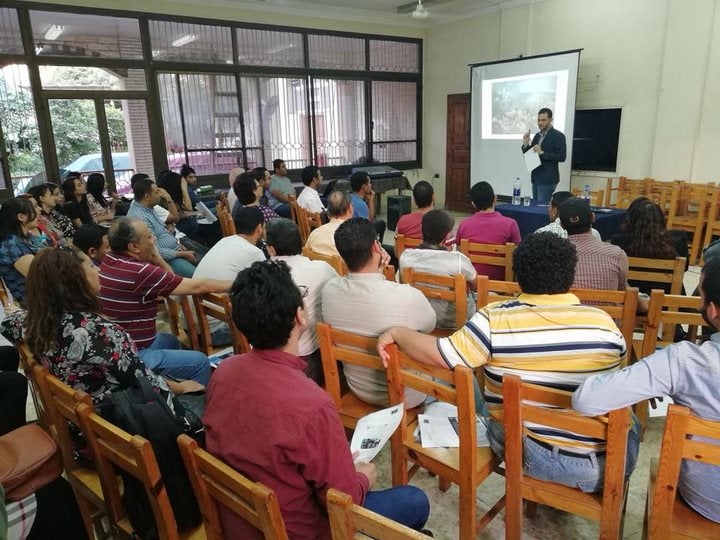
يؤكد “علي” ضرورة الارتقاء بالعلوم الاجتماعية والإنسانية والفنون في المجتمعات العربية
شمس الفلسفة
يشاكس “علي” عقول مستمعيه وقلوبهم في ندواته وورشه بأسئلة مثل: كيف للخيالات والأفكار والأشخاص والجماليات التاريخية أن تعيد التفاوض بشأن علاقة المواطن بالمدينة؟ وكيف يمكن للموضوعات الفلسفية الارتقاء بفهم المرء للفضاءات المألوفة مثل الأحياء والمقاهي؟
يؤمن “علي” بأهمية العلاقة بين الفلسفة وعلم الاجتماع، مضيفًا في تصريحات لـ”للعلم”: الفلسفة تشبه الشمس المستعرة، في حين يشبه علم الاجتماع “النظارة الشمسية” التي توفر الظل الذي يحجب تلك الشمس قليلًا، ويكشف تدرجات الموضوع الفلسفي وتلاوينه ونبراته ونغماته وحدوده بما يساعد على نقل الأفكار إلى الآخرين، ربما بدا الأمر صعبًا، لكن حين يتحول عبوس الحاضرين في النهاية إلى ابتسام هنا تكون المكافأة.
اعتاد “علي” المشاركة في مشروع التحرير لاونج جوته بمصاحبة مؤسِّسة المشروع ومديرته “منى شاهين” في الفترة منذ 2017 وحتى 2018، تم تنفيذ المشروع في محافظات القاهرة والإسكندرية والمنيا، واستهدف تقديم الفلسفة وعلم الاجتماع للجمهور المصري بطريقة عملية ومفهومة.
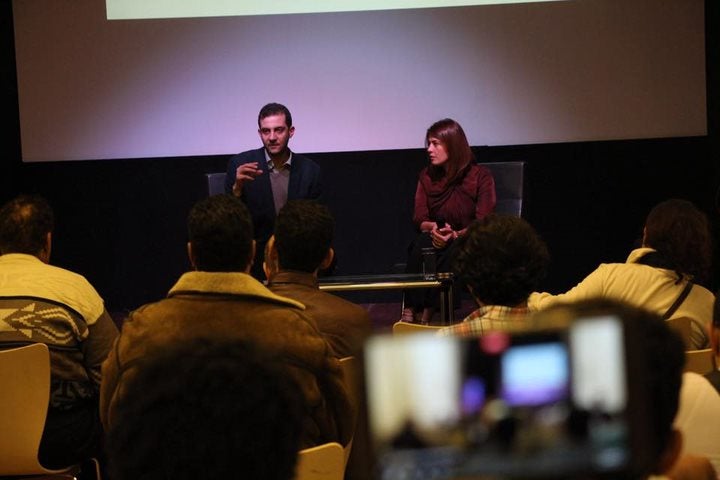
إحدى ندوات “علي” ضمن مشروع التحرير لاونج جوته بمصاحبة مؤسِّسة المشروع منى شاهين
تُعرِّف منظمة “اليونسكو” الفلسفة -والتي تعني “حب الحكمة”- بأنها “ممارسة يومية من شأنها أن تُحدِث تحولًا في المجتمعات، وأن تحث على إقامة حوار الثقافات واستكشاف تنوع التيارات الفكرية، وبناء مجتمعات قائمة على التسامح والاحترام وإعمال الفكر ومناقشة الآراء بعقلانية، وخلق ظروف فكرية لتحقيق التغيير والتنمية المستدامة وإحلال السلام”.
الفلسفة والحياة
ربما دفعت تلك الهالة “علي” باتجاه دراسة الفلسفة والسعي إلى تبسيطها، مضيفًا: تَولَّد لديَّ اهتمام بالفلسفة في وقت مبكر من حياتي، وفي عام 2013 زاد اهتمامي بدراسة الفلسفة، قبل ذلك كنت أهتم أكثر بالعلاقات الدولية والسياسة وعلم الاجتماع، في ذلك التوقيت حدثت تغيرات كثيرة في مصر والشرق الأوسط، وهي تغيرات احتاجت إلى دراسة أكثر عمقًا لقراءة المشهد، ووجدت أن الفلسفة يمكنها تقديم صورة أكثر عمقًا ووضوحًا مما يبدو على السطح، في ذلك الوقت تعرفت على “حمزة يوسف”، الذي ينظم محاضرات دينية لا تخلو من الفلسفة في الولايات المتحدة الأمريكية، علمني “يوسف” أن الفلسفة يمكنها أن تساعد في تقديم صورة أوضح للقضايا الدينية.
يقول “علي”: لطالما كنت مهتمًّا بالدمج بين حقل علم الاجتماع وأفكار الفلسفة للخروج بنمط معين لمناقشة الفلسفة وفق السياقات المصرية والعربية، أحببت الفلسفة لأنها تقوم على طرح الأسئلة دون فرض حلول، ومحاولة فهم تطورات الأمور، وهذا كان مهمًّا جدًّا بالنسبة لي، أقول دائمًا في محاضراتي إنك “لو لم تُفلسف، سيكون هناك شخص آخر يُفلسف لك”، الفلسفة مرتبطة بالحياة، لو جلست في مقهى، وشاهدت أشخاصًا يشاهدون مباراةً لكرة القدم وهم يصيحون، بينما يطالبهم شخصٌ آخر بالهدوء، فإنهم يردون عليه بأنهم يريدون مشاهدة المباراة، هذه هي “الفلسفة النفعية“، وإذا أخبرك شخصٌ بأنه سيذهب إلى الساحل الشمالي للاستمتاع بوقته، فإن هذا التصرف يدخل في نطاق “فلسفة المتعة”، الفلسفة مرتبطة بكل شيء نفعله حتى لو بدا هذا الشيء غير مرتبط بالفلسفة.
حواجز الخوف
يقول “ابن رشد”: يؤدي الجهل إلى الخوف، ويؤدي الخوف إلى الكراهية، وتؤدي الكراهية إلى العنف، وهذه هي المعادلة.
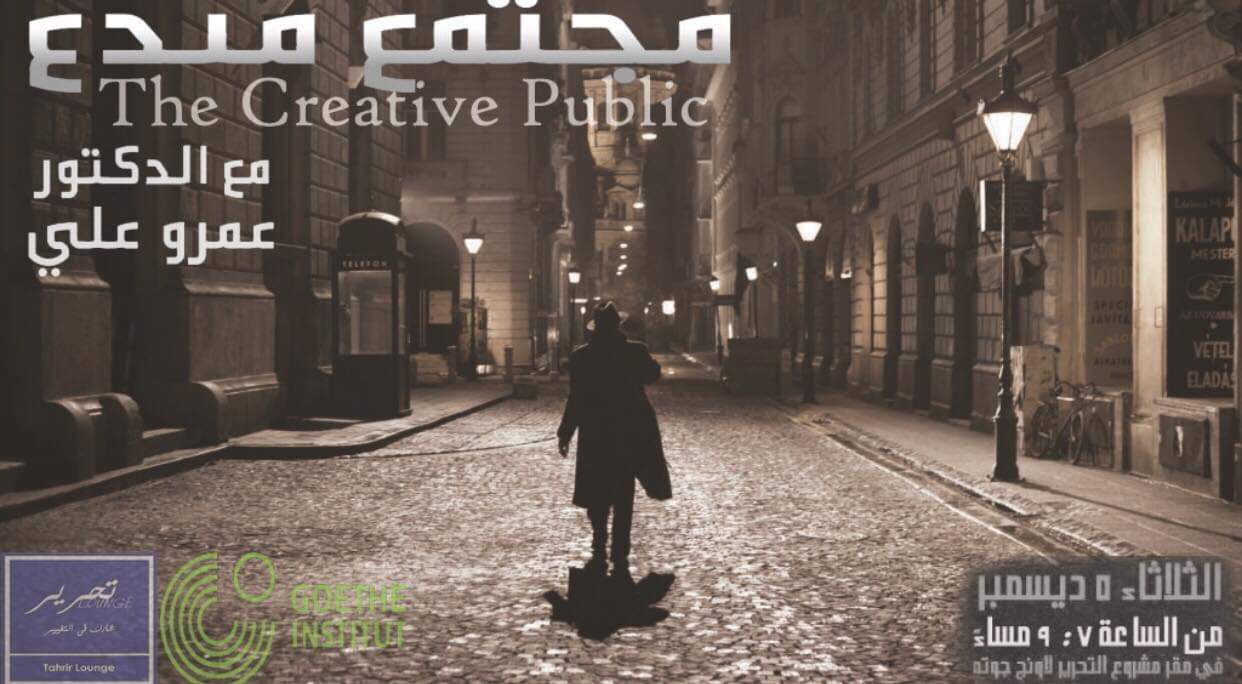
ربما صنعت مقولة “ابن رشد” أحلام “علي” ودفعته إلى كسر حواجز الجهل والخوف والكراهية والعنف عن طريق تبسيط قوانين الفلسفسة، مضيفًا: يجب توصيل الفلسفة للعرب والمصريين بأمثلة تتفق مع ثقافتهم، وحتى داخل الوطن الواحد يجب أن ننوع الأمثلة، بحيث نختار أمثلةً تتفق مع الطبيعة الأسوانية إذا كنا نتحدث إلى أشخاص من أسوان، وأن ننتقي أمثلةً سكندرية إذا كنا نخاطب أناسًا من الإسكندرية.
حنين إلى الإسكندرية
يؤكد “علي” أن الأسرة أدت دورًا كبيرًا في دفعه باتجاه الاهتمام بالعلوم في وقتٍ مبكر من حياته، مضيفًا: وُلدت في الإسكندرية، لكنني نشأت في أستراليا، لم يكن والدي معتادًا على القراءة، لكنه أراد تعويض ذلك من خلالي، كان والدي يشتري كتبًا باللغة الإنجليزية من أجل تشجيعي على القراءة، أحببت النظر إلى الخرائط، كنت أنظر إلى الخريطة وأبحث عن مصر وأتعجب من المسافة الكبيرة بين مصر وأستراليا، كنت أعيش في مدينة “بيرث” في غرب أستراليا، وهي مدينةٌ تُعرف بأنها “أبعد مدينة في العالم”، كنت أحلم بالعودة إلى مصر، من هنا بدأت أنظر إلى التعليم باعتباره وسيلةً للسفر ورؤية العالم.
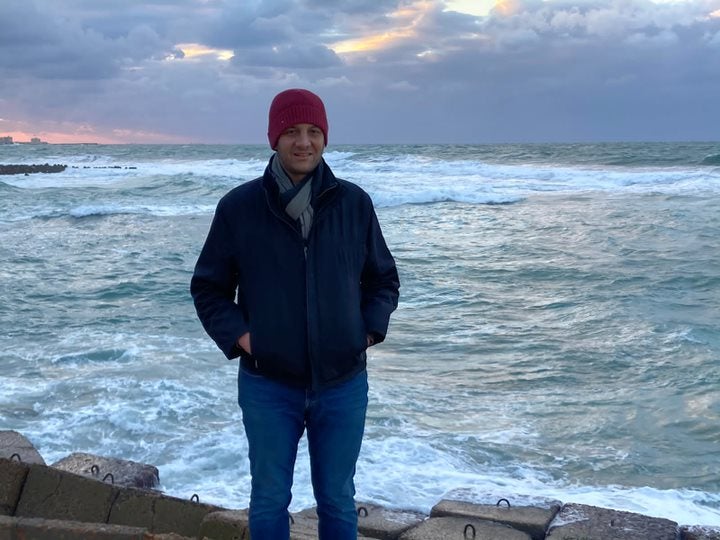
يؤمن “علي” بأن الإسكندرية تمثل حلمًا وخيالًا لكل شخص بدايةً من مؤسسها الإسكندر الأكبر
ويضيف: لم أنسَ لحظةً أنني وُلدت في الإسكندرية، كنت أحرص على قراءة –ولو أشياء بسيطة- عنها، آمنت بأن الإسكندرية هي منبع الثقافة، يكفي أنها كانت مكانًا لمكتبة الإسكندرية القديمة التي احترقت في عام 48 قبل الميلاد، ميلادي في الإسكندرية خلق لديَّ شغفًا بالعلوم والتعليم، أؤمن بأن الإسكندرية تمثل حلمًا وخيالًا لكل شخص بدايةً من مؤسسها الإسكندر الأكبر ومرورًا بـ”ابن بطوطة” وغيره من الرحالة العرب الذين مروا عليها، هناك إحساس في مخيلة هؤلاء جميعًا بأن الإسكندرية تمثل المدينة الفاضلة، لا أحد يتحدث عن الإسكندرية بواقعية، ولكنهم يتحدثون دائمًا عنها بقدرٍ من الخيال.
جذبت “علي” أعمال “حنة أرندت” بعدما لفت انتباهه إليها المشرف على رسالته للدكتوراة، وتحديدًا كتابها “الحالة الإنسانية” (The Human Condition)، الذي أدى دورًا بارزًا في رحلة تطوره الفكري، مثلما أثرت فيه بشدة كتابات الدكتور إدوارد سعيد، أستاذ الأدب المقارن في جامعة كولومبيا الأمريكية.
الفلسفة والدين
يؤمن “علي” بأن الفلسفة ليست ضد الدين، مضيفًا في تصريحاته لـ”للعلم”: ترتبط الفلسفة ارتباطًا وثيقًا بالدين والرياضيات والعلوم الطبيعية والتعليم والسياسة، وهي أم العلوم، ولا تعارُض بين أفكار الفيلسوف وتأملاته العقلية وعقيدته الدينية، لطالما سعيت إلى تبديد أسطورة أن الفلسفة تعارض الدين، وساعدني في ذلك الإشارة إلى أن شخصيات مسلمة مثل “الفارابي” و”ابن رشد” و”ابن سينا” كانوا فلاسفة، وحتى أبو حامد الغزالي، الذي يرى البعض أنه كان ضد الفلسفة، أتعامل معه باعتباره فيلسوفًا وأنه كان ضد جزء من الفلسفة كان موجودًا في عصره، وهناك أيضًا القديس أوغسطينوس، هناك -بطبيعة الحال- فلاسفة ملحدون، لكن هناك أيضًا فلاسفة متدينين على اختلاف دياناتهم السماوية.
الارتقاء بالعلوم الاجتماعية
يقول “علي”: نحتاج إلى الارتقاء بالعلوم الاجتماعية والإنسانية والفنون في المجتمعات العربية، لو كنت تجلس على مقهى في مصر وسألك أحد عن مهنتك، وقلت له إنك طبيب أو مهندس فسيتعامل معك باحترام، لكن لو أخبرته بأنك متخصص في الفلسفة أو علم الاجتماع أو التاريخ أو الفنون الجميلة، فسيتعامل معك باستغراب، وربما سألك عن سر اختيارك لتلك التخصصات التي لن تساعدك على تأسيس حياتك، تلك القاعدة تحتاج إلى تغيير، من الصعب أن تكون كلية الحقوق في أستراليا والولايات المتحدة الأمريكية كلية قمة بينما يحدث العكس تمامًا في مصر بالرغم من أن زعماء الحركة التاريخية المهتمين بمستقبل مصر -مثل مصطفى كامل ومحمد فريد وسعد زغلول- كانوا من خريجي الحقوق، أعرف أن الحقوق ليست من الآداب، لكن يجب تدريس العلوم الاجتماعية إجباريًّا في كل الجامعات كما هو الحال في العديد من الجامعات الغربية.
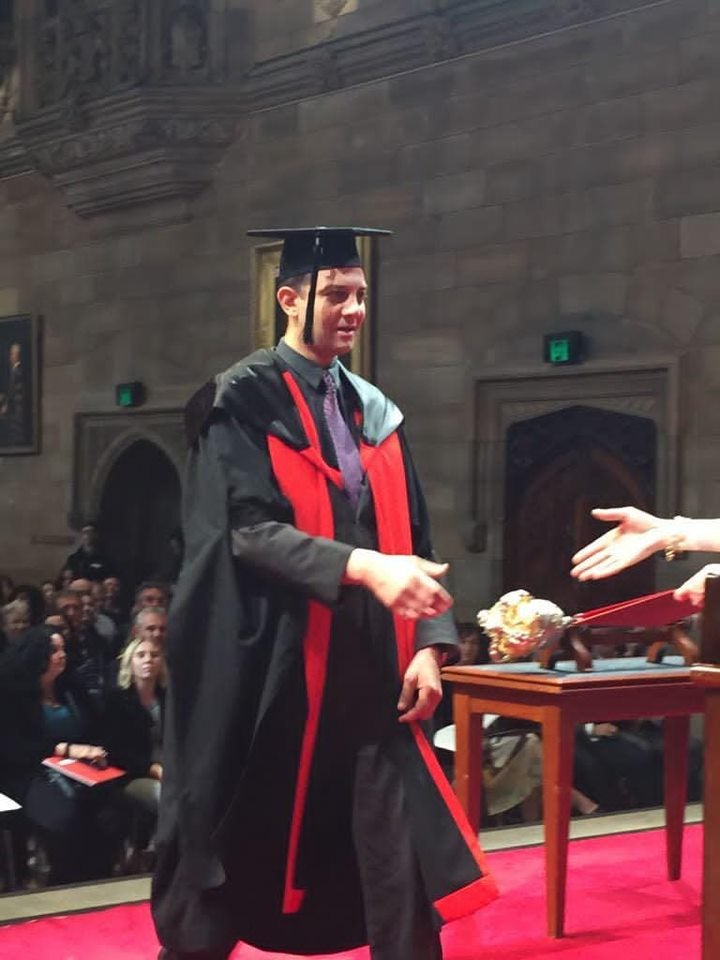
يوضح “علي” أن الفلسفة يمكنها تقديم صورة أكثر عمقًا ووضوحًا مما يبدو على السطح
ويضيف: تأثرت جدًّا بقصة قائد كشافة حضر إحدى ورش “مشروع التحرير لاونج– جوته”، التي كانت تُعقد تحت عنوان “مسرح الفكر”، قال هذا الكشاف إنه تمنَّى لو أحضر معه شابًّا في التاسعة عشرة من عمره لحضور هذه الفعاليات، وردت “منى شاهين” بأنه يمكنه إحضاره في الجلسة التالية، فأجاب قائد الكشافة بأن هذا لم يعد ممكنًا؛ لأنه كان يجلس مع هذا الشاب، الذي كان يستعد للالتحاق بكلية الهندسة، في مقهى بالقاهرة، وفي أثناء حديثهما، سمعهما النادل الذي يقدم القهوة وقال إنه خريج كلية الهندسة، أُصيب الشاب بالرعب من أن مستقبله قد ينتهي بتقديم القهوة بعد إنهاء دراسته الهندسية، وبعد يومين انتحر الشاب، يجب أن نتعلم أن كل مهنة لها كرامة.
The Humanities in the 21st Century: Perspectives from the Arab World and Germany
Amro Ali, “Bringing Philosophy and Sociology to the Egyptian Public” in The Humanities in the 21st Century: Perspectives from the Arab World and Germany, Eds. Nuha Alshaar, Beate La Sala, Jenny Oesterle, Barbara Winckler (Berlin: Forum Transregionale Studien, 2022).
This book is open-access. The Arabic version can be accessed here. For more information on the project and conference, click here.
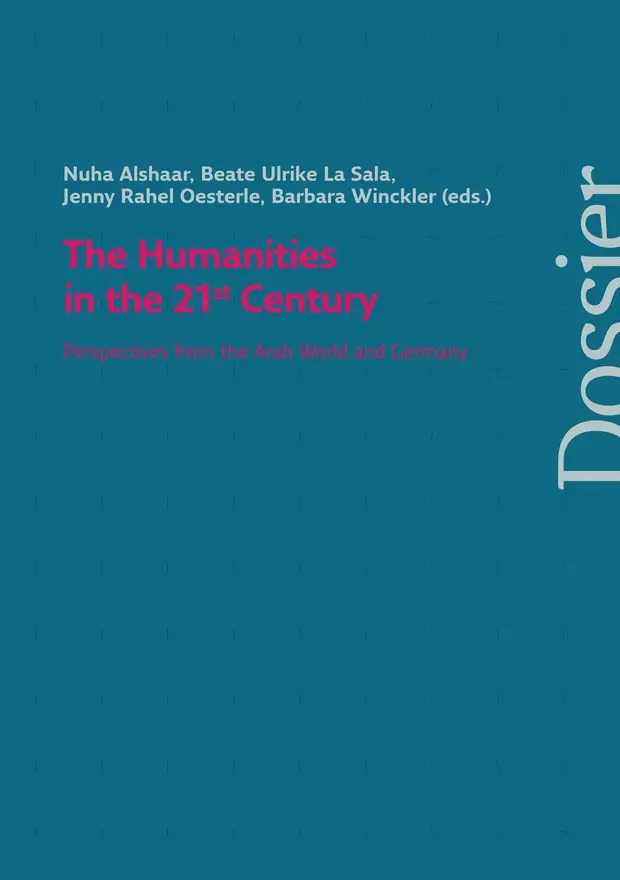
Chapter abstract:
The chapter briefly examines the conditions and method of bringing sociological-philosophy to the Egyptian public, as well as the role of agency that engages audiences.
An enthusiastic Egyptian youth exited the closing of a lecture event in late November 2017 and rushed to a coffeehouse near Tahrir Square to meet up with his friends. He told them about this woman thinker called ‘Hannah Arendt’ who he just learned about and her peculiar idea of ‘new beginnings.’ Several nearby curious patrons overheard the chatter and enquired about the philosopher. The social circle widened, and the youth continued discussing the lecture that he had just attended. It would see some of the patrons coming to the next lecture session on Walter Benjamin’s loss of aura concept.
Book abstract:
The role of the humanities, their standing in the academic field and their impact on society are questions of global relevance. Why is it important to study, teach and do research in the humanities? What role do the humanities play in the Arab world and Germany—both in the academic domain and the public sphere of ‘societies in change’? Which challenges and obstacles do scholars in the humanities face across the Arab world, especially in war or postwar situations, such as in Syria, Yemen or Iraq, and which research opportunities do the students and academics have? What could be done to strengthen the humanities in the Arab world, in Germany and on a global level? And what can we learn from each other’s experiences? These and other questions were raised and discussed at the international conference ‘The Place of Humanities in Research, Education and Society: An Arab-German Dialogue’, which was held in Berlin in November 2019, as part of the activities of the Arab-German Young Academy of Sciences and Humanities (AGYA). This collection of essays, titled ‘The Humanities in the 21st Century: Perspectives from the Arab World and Germany’, which was first published as a blog series, takes up key issues that were raised and discussed during our conference.
Salvaging Sacred Time: Approaching Islamic Ritual through Byung-Chul Han
Book: Faith Travels by Streetcar (Ed. Dr. Stefan Maneval.)
Chapter: “Salvaging Sacred Time: Approaching Islamic Ritual through Byung-Chul Han” (Amro Ali)

Chapter abstract:
In “Salvaging Sacred Time” the Egyptian-Australian sociologist Amro Ali discusses the importance of religious rituals for the perception of time. He draws on the work of German-Korean philosopher Byung-Chul Han who identifies a “decay of time” following the Enlightenment. Ali contradicts this thesis insofar as he shows that Islamic rituals, such as the five daily prayers obligatory for devout Muslims and the pilgrimage to Mecca, still have a structuring, life-stabilizing effect, and furthermore create a sense of community and life-giving orientation.
Book Abstract
How do faith, norms, and objects of daily use relate to each other? Does faith necessarily imply a limitation of freedom? How do members of religious and non-religious communities give visibility to their beliefs, and how are they perceived from the outside?
Both religious and secular normative practices which structure and regulate public and private life often involve objects of daily use. Focusing on the rules, convictions, and conventions of the monotheistic religions – Judaism, Islam, and Christianity – as well as on secular beliefs, Faith Travels by Streetcar combines photos of such objects and texts written by scholars of various disciplines: sociology, philosophy, Arabic, Islamic and Jewish studies, as well as Protestant Theology.
The objects included in Faith Travels by Streetcar relate to norms and rules surrounding food consumption, clothing and fashion, as well as education and play. While on the one hand showing that rules and norms which limit the freedom of the individual exist in all societies, the items displayed in this volume also highlight how these norms and rules are constantly contested and subjected to negotiation, dispute, and change. The permeability and fluidity between faith, norms, and deliberate limitations of one’s freedom for the sake of the common good or a belief is mirrored in the art installation by Tim Greaves, created for an exhibition curated by the editor, Dr. Stefan Maneval.
The book is in English and German.
The peculiar demise of pluralism in the Eastern Mediterranean (Istanbul)

I was delighted to give a lecture and workshop for Turkish students and cultural workers as part of the Summer School at the Swedish Institute Istanbul titled: Remembering and Coexisting in Turkey and the Eastern Meditteranean. We focussed primarily on Istanbul and Alexandria, discussing how the latter has become a bellweather for the erosion of pluralism, and how Istanbul understands this “demise” of Alexandria, and the warning it serves it and other cities.
Bringing Philosophy and Sociology to the Egyptian Public (public lecture)
This lecture will discuss how sociology and philosophy are conveyed to the public in restrictive contexts in the Arab world. Using Egypt as an example, Dr. Amro Ali will outline the approach taken to teach the social sciences and humanities to public audiences in Cairo and Alexandria. This is premised upon the idea that the public should be recognised, and elevated, as the primary ideal, and the individual’s present difficulties in experiencing or attaining pluralism and civic responsibility are tied to the city’s loss of meaning and the citizen’s alienation from one another. The development of socio-philosophical thinking in local spaces can help address this malaise. The lecture will be presented via Zoom at the Australian National University.
Date: 9 June.
Time: 9.30am (Cairo/Berlin) – 5.30pm (Sydney)
Details: https://cais.cass.anu.edu.au/…/cais-public-lecture…
Background essay on the topic: https://trafo.hypotheses.org/28053
Podcast: On the Need to Shape the Arab Exile Body (with Amro Ali)
This is a conversation with Amro Ali, author of the essay “On the Need to Shape the Arab Exile Body in Berlin.” He is also co-president of the Arab-German Young Academy of Sciences and Humanities, research fellow at the Freie Universität Berlin, and lecturer in sociology at the American University in Cairo (AUC).
What we talked about:
- Moving from the centers to the peripheries
- Why Berlin? And not London, Paris, New York or Istanbul
- Berlin as an incomplete city and Germany’s past
- Germany and the Arabs
- The Koblenz trial, accountability in Germany (but not in the Arab world)
- January 25 and the legacy of the Arab Spring for the exile body
- Home as the place where all attempts to escape cease
- Valuing public spaces
- Survivor’s guilt and impostor’s syndrome
- Challenges faced by Arabs and other non-white people in Berlin
- Meeting other Arabs for the first time in Europe
- The need for a connection between Berlin and other capitals, such as Beirut or Tunis
- Politics of language and the use of Arabic in the diaspora
Recommended Books:
- City of Exiles: Berlin from the outside in by Stuart Braun
- Representations of the Intellectual by Edward W. Said
- Exile, Statelessness, and Migration: Playing Chess with History from Hannah Arendt to Isaiah Berlin by Seyla Benhabib
Resources Mentioned:
Alexandria: the Far Eastern Capital of the Maghreb
I will be giving a public lecture at Leiden University on 21 January 2022, titled “Alexandria: The far eastern capital of the Maghreb” which is based on the recent essay “Where couscous ends: Maghrebi routes to Alexandria.”
Time: 11am (Alexandria time) / 10am (Amsterdam time)
The zoom link can be accessed here and does not require registration.
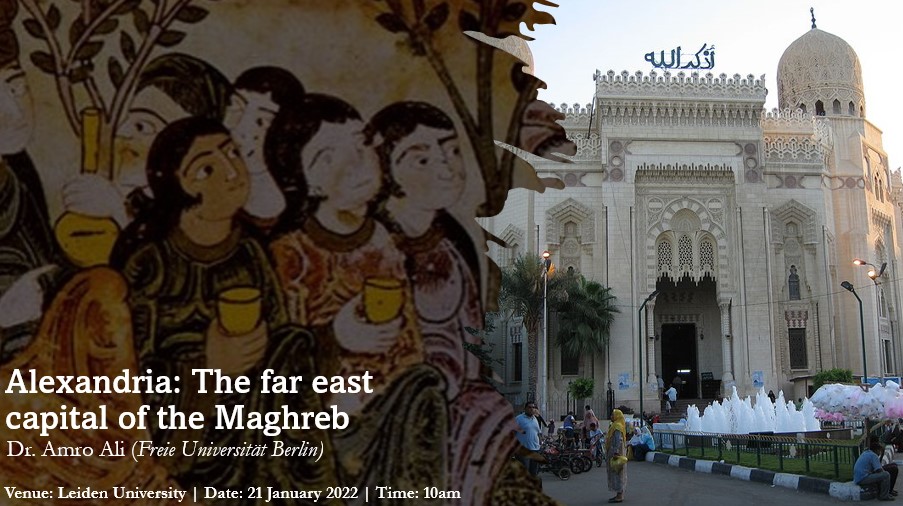
Alexandria, Climate Change, and the Mediterranean Narrative
This short essay originally appeared in the Madrid–based Fundacion Alternativas.
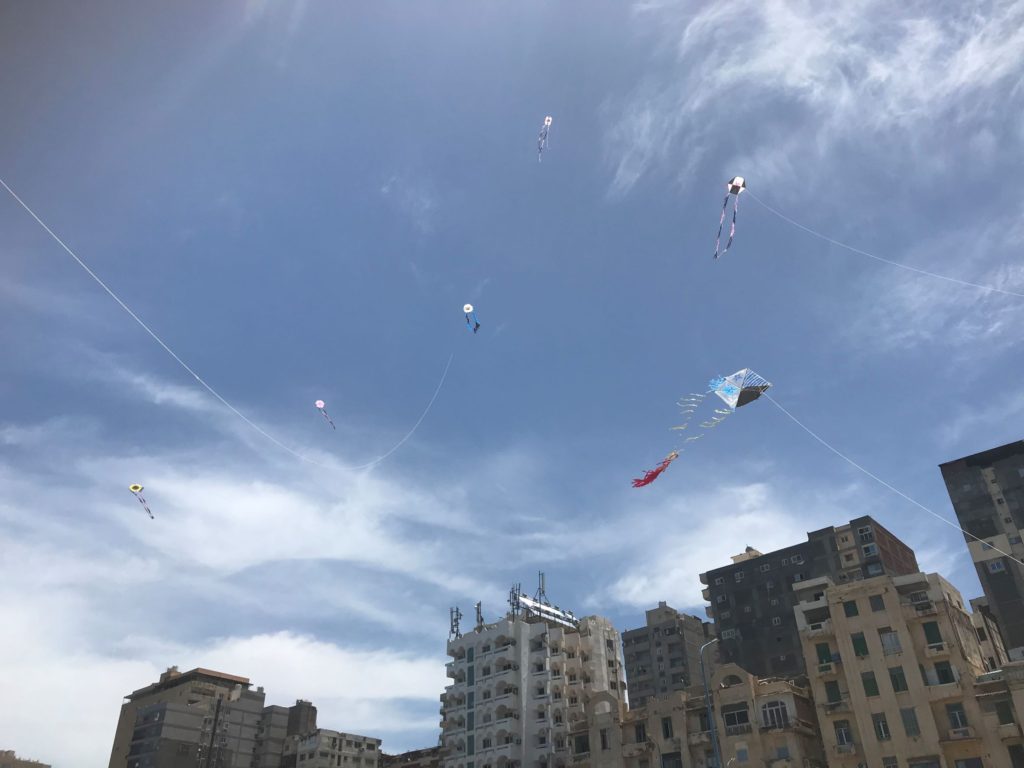
The modern history and contemporary nature of Alexandria is a brew of different identities that give off (or once gave) a distinct resonance: Mediterranean, Egyptian, Arab, African, Middle Eastern, Islamic, Christian, Jewish, Levantine, among others. But the one profile that emerges as rooted in Alexandria’s existential survival is the Mediterranean identity. Within a few decades, rising sea levels will inundate parts of Alexandria in what could be the start of history’s closing curtains on the 2300-year-old city. Along with political and institutional will, it is imperative that Alexandria’s relationship to the Mediterranean shifts its face from past and present towards the future and pushed further into a wider regional narrative.
Ask an Alexandrian what makes up their identity and the first word you will most likely hear is the sea. The sea is central to the popular imagination, literature, films, theatre, escapism, growing up, families, wedding shoots, and a street art that reflects the bond with the sea and its history and myths: mermaids, citadel, centurions, Alexander the Great, and lots of ship-themed graffiti. Right down to the common line “If I leave Alexandria, I will feel like a fish out of water.”
The long stretch of corniche and wave breakers have displaced the beaches as the dividing line, liminal space, and intersection between the public and the sea. Access to the corniche and the ability to see the sea is a continuing battle in light of the privatisation and “development” drive that has, in many cases, cut off the public from viewing the sea, let alone accessing it. Yet pockets of communal respite are to be found. At the outset of the pandemic, the corniche furnished many of Alexandria’s young with the newly discovered hobby of kite flying that became a unifying public spectacle as even street children could get access to cheaply made kites. I had never seen that high degree of elation induced by any activity before on the corniche in many years. Barely a month or so passed and the kites were banned by the government on the official reason that they were behind a series of accidents (which is a legitimate concern but outright banning is different to regulating). The kite had, for a moment, become a hovering icon that connected sky, sea, corniche, and public.
To speak of Alexandria in a regional narrative is nothing new. Since the 1990s, elite efforts have been made to reintegrate Alexandria into the Mediterranean imaginary – albeit a neoliberal one that succeeded its colonial predecessor. The government rehabilitated the façade of the city as several institutes directed energies to crystalizing Alexandria’s role in the Mediterranean world which included the Bibliotheca Alexandrina, Anna Lindh Foundation, and the former Swedish Institute, along with various cultural centres and initiatives.
Yet an endeavor needs to expand the notion of the sea from one linked to the past that evokes nostalgia and childhood memories, as well as the present that touches upon romance, enchantment, leisure, and livelihoods, to a future where an apocalypse looms on the horizon. Not to terrify the populace, but rather to deepen civic responsibility – from anti-littering to reconsideration of investment decisions – as part of the fight against climate change that can complement the respective policy on the matter. As well as linking Alexandria to efforts made by other cities in the basin as part of an unfolding story that aims to rescue the historical hubs of the middle sea. However, short of radical adaption measures, it is Alexandria, the only major city in the Mediterranean, that is at the highest risk of being largely submerged by 2050. It is no wonder why popular Google searches for Alexandria in the context of climate change reveal bizarre questions such as “Does Alexandria Egypt still exist?” and “who destroyed Alexandria Egypt?” It is an omen the city can do without.
Time and again, events have shown that Alexandrian public engagement or interest, particularly among the young and students, in their city’s welfare is heightened when they feel the city is part of a regional or global story – whether it be visits by foreign heads of state, clean up campaigns, artistic troupes, or the Africa Cup. It is part of the conscious Alexandrian mode of living to make sense of the fractured present while living in the shadow of multiple ancestral giants. It is the “nature of identity”, individual or city identity no less, “to change depending on time, place, [and] audience.” In this case, the repositioning of Alexandria’s Mediterranean identity can no longer be limited to culture wars, Euro-centric elites, and postcolonial critiques. It is now a question of survival.
As I have argued before, the Mediterranean is a laboratory with natural demarcations, rich history, trade, and cultural ties that could enable “an overarching new Mediterranean narrative to be written through a series of conferences, symposiums, workshops and accessible publications” with the possibility of contributing to “animating forms of transnational citizenship, a project that builds a Mediterranean platform” that can construct a new narrative and social contract.
Alexandria needs to feel part of the neighborhood story and brought into a mission in which its fate is tied with the same menace confronting Beirut, Tunis, Tangiers, Barcelona, Marseilles, and the rest of the cities dotted around the basin. While many Mediterranean cities will suffer from rising sea levels to hotter temperatures, the menace is eyeing Alexandria with the utmost ferocity and has earmarked a swathe of the city to be turned into one large underwater museum. A rising sea level that will perhaps regurgitate onto the city’s future and permanently flooded streets the thousands of abandoned facemasks and lost kites.
Can we still speak of a Mediterranean lifestyle?
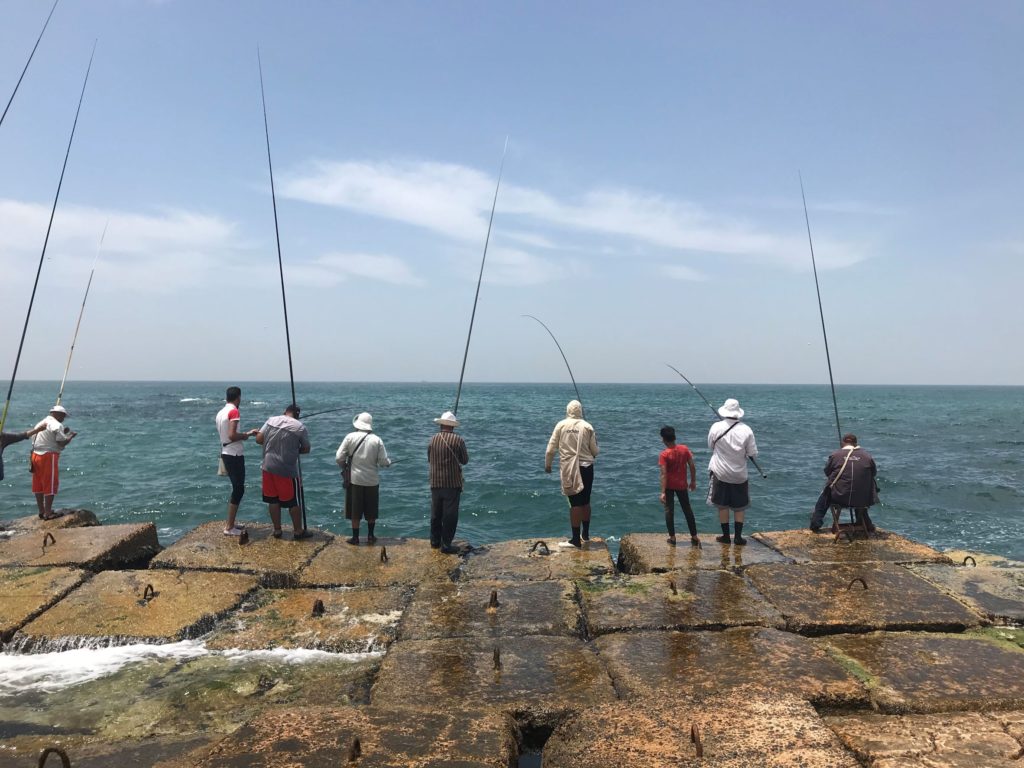
This essay was first published in German in the Berlin journal Die Politische Meinung (PDF) under the title, Mediterran?: Eine Lebensart und das Phänomen der Entfremdung (“Mediterranean?: A way of life and the phenomenon of alienation”) and later appeared in the English edition of the same journal.
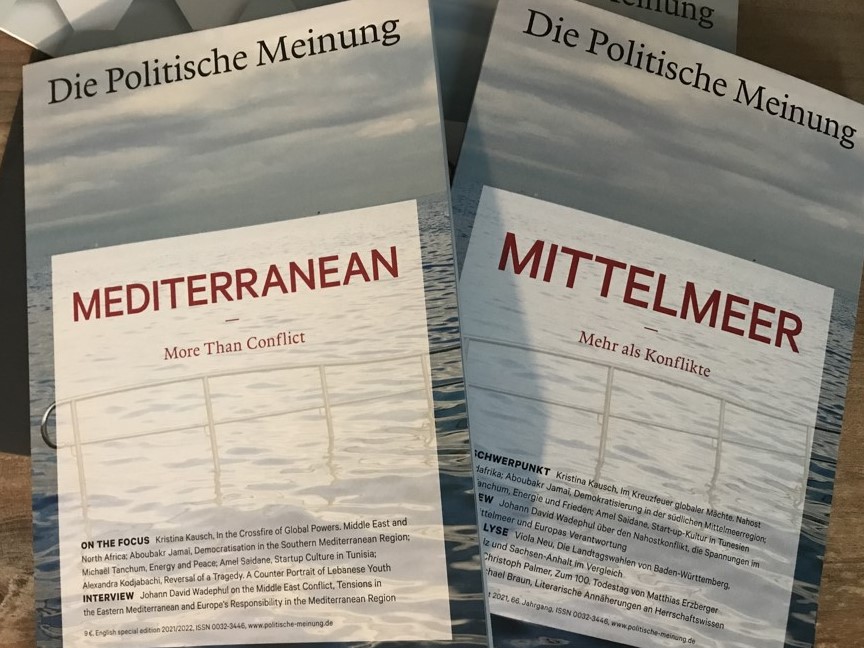
“At my first sight of the Mediterranean world I realized that I had never known light before. I was from the world of darkness. London was not so bad, but the light of the northwest is a very dull light. The light of the Mediterranean held my eyes so I decided to stay for a time.” – Albert Hourani (1915-1993)
Hearing the word “Mediterranean” can elicit metaphors of cruises, golden beaches, lush hills, and succulent cuisines. In fact, follow up Mediterranean by appending the words diet, sunset, and villa, among others, and you have already produced the mental image of a semi paradise on earth. Yet the so-called “Mediterranean lifestyle” is often a highly-charged romanticised product of western consumption habits, holiday brochures, and diaspora musings – with a heavy focus on Greece, Italy, and Spain with the rest of the other Mediterranean countries at times acting as background furniture. The lifestyle is habitually treated as a given – it evacuates economics, class, and gender, and presumes that geography is all that counts. I want to visit this idea of the Mediterranean lifestyle and broaden its meaning, to look at how modern alienation ails the notion of the Mediterranean lifestyle and how we can think of it beyond its olive oil coat of arms.
In the literature and popular culture, the Mediterranean lifestyle is mostly the domain of food consumption, followed by tropes such as laughter, simplicity, passion, pleasure, living the moment, and visiting family and friends. This is not to say that none of these can be true or one does not relate to them on some level, but an idealised Mediterranean lifestyle is a claimant to a shared identity and space which does not necessarily exist for many.
The Mediterranean lifestyle weds a collective imaginary with an individual identity to form outlooks, attitudes, social relations, and possessions. As a key marker of social geography, the sea is an integral piece to the mosaic of personal identity. Inhabitants of the cities dotted around the sea will have some conception of a lifestyle uniquely tied to the sea. This distinguishes their coastal metropolis as different or “privileged” by virtue of being by the water, even if they do not necessarily call it the Mediterranean lifestyle. Sitting on opposite ends of the basin’s shore, a Spaniard in Barcelona and a Palestinian in Gaza would understand the sea differently. It can be a poetical space or a tormenting space, but it can also be one of shared possibilities.
Retrospective of a wonderful sea
Yet it is one of the ironies that a beautiful basin can be made the least economically viable. The story is an all too familiar one. The newly-minted graduate in Alexandria that eats her last seafood meal with loved ones before rushing to catch the train to start her new job in Cairo; the Sicilian youth in Palermo that gives one last glance to the sea before migrating to the affluent north in search for work in landlocked Milan; the underemployed Greek man who leaves his homeland for the colder but prosperous lands of the EU; the young Lebanese woman who has for years worked in Beirut’s culture scene and has decided to leave for Montreal to start her PhD, not only for educational advancement but to acquire a western passport as a form of mobility and partial restitution justice in an unequal world. Over the years, you get the impression that no one seems to want to leave the Mediterranean, but they are given little choice. Short of family connections, viable monetary inheritance, access to meaningful employment, ability to save, marry and buy a home; a growing number choose to abandon a wondrous sea that does not deserve to be abandoned.
Historically, the Mediterranean is not without its darkness. It is the sea that saw millions of deaths and gallons of blood spilled over the centuries through empire building, colonial conquests, pirate raids, and two world wars that turned blue skies into recurring passages of grey. Not to mention today’s refugee who flees political persecution and economic destitution, and dreads the possibility that the sea might become his or her graveyard.
But history is not always a history of sorrow and despair. In the everyday spectrum of life, there was a time when the Mediterranean lifestyle was understood as part of the sacred route by a Muslim pilgrim from Tangiers crossing several cities of the Mediterranean to eventually reach Mecca. The traders from Venice and Damascus that intermingled at the port in Alexandria. The Syrian that decided not to leave Tunis after he married and settled down there. The aspiring scholar on the Libyan coast that goes to Al-Andalus to further their studies.
A distortion of time and space
This is not to engage in a past utopia but to highlight that mobility was much more frequent among key demographics that enabled a holistic approach to the Mediterranean unlike our modern era which is characterised increasingly by forms of alienation. To speak of a vibrant Mediterranean lifestyle today requires some contemplation on the missing human encounters and away from mutant capitalist discourse that treats individuals as commodities zapping between resorts for Instagram shots, and mostly by travellers from the global north.
The alienation, in part, commenced long ago when port cities fell out of fashion with the dramatic reduction in the use of sea travel and the rise of commercial airlines in the mid-twentieth century which meant a person can go from Athens to Cairo, bypassing Alexandria. The once demanding but rhythmic process of departure and arrival across the sea now took on a radical change in which the human being exited the terrestrial order and was now suspended above the sea and moving at high velocity across the skies. Time and space were not only distorted, but the traditional relationship between humans and sea became a form of alienation limited to touching or swimming in the waters of one’s respective city, rather than traversing it. The once familiar homecoming and farewell scenes at ports greatly diminished. Civilian travel by sea was now mostly restricted to trips of limited duration and environmental-destructive cruises.
The 1990s saw the revival of port or second cities, such as Tangiers and Alexandria, that became favourable to neoliberal trade and transnationalism which, unlike capital cities that heavily invested in national culture, favoured cultural experimentation given that it could also be monetised. But this new Mediterranean world fell victim to the Washington Consensus, northern European banks, privatisation, environmental damage, and debilitating strands of neoliberal modernity. The expression “I no longer recognise my city” became a frequent mantra of a new internal exile in the Mediterranean.
The other form of alienation is governed by the visa regimes and passport tyranny, especially for the southern and eastern shores. As I have written before, “no transnational Mediterranean project can materialize when one side faces insurmountable inequalities in partnerships, safety, movement, and engagements.”[1] While I was specifically referring to the notion of a Mediterranean social contract and projects, the absence of equitable passport and visa arrangements still has the effect of skewing lifestyles in the lands of the global south depriving them of meaningful travel, exposure, and growth in their own neighbourhood. This is not only obvious from south to north; an Italian national can visit the entire countries of North Africa and the Levant with little to no effort in terms of no-visa requirement or a cheap visa on arrival. The Egyptian national does not know this world, travel is possible but it comes at a high probable chance of rejection by the consulate. The postcolonial story is one of insecurity even towards fellow global south countries. The end result is that the Italian is able to acquire a developed acquaintance with the region which add layers to his or her understanding of the Mediterranean lifestyle while the Egyptian is trapped in a provincial dimension of what constitutes his or her idea of that lifestyle. The Mediterranean lifestyle is not just a social or economic question, it is in the end, a political one.
Perhaps the Mediterranean lifestyle needs an accompanying conversation on developing a Mediterranean philosophy, one that correlates and thinks with rising political thought and activities through a shared space beyond markets. Activists and organisations are glaringly aware of the inequalities and are endeavouring to revive some sort of philosophy or social contract grounded in human rights, climate change initiatives, backed by the pandemic-induced shunning of long-haul flights in favour of short trips. Yet as someone who has sat through numerous meetings at the institutional level to discuss subjects related to the Mediterranean, I would sometimes wonder where are we going with all this? Gianluca Solera, who has advocated for a “renaissance” of the Mediterranean, argued that institutions with a Mediterranean mandate suffer from “deleterious development ideas, the same void decision-making mechanisms, the same discriminatory interpretation of citizenship, the same lassitude vis-à-vis its founding values would be produced, in the middle of a crisis, which is, before being economic, a political and cultural one.”[2]
“Return to origin” myth
It is heartening that there has been a growing interest in the Mediterranean that has been driven by organisations, cultural currents, universities, and international bodies and this stems from the fact that the Mediterranean sells itself: it is a metaphysical blueprint and socio-geographical crossroads that furnishes centuries of civilisations, scholarship, trade, religions, philosophies, and marriages. In a sense, there is a “return to origin” myth that enchants even the coldest of cold international bureaucracies that deal with the Mediterranean subject. But the question remains, how to readjust the gaze at the sea that is often one of distortion? Exacerbated by the excessive focus on the securitization and the refugee crisis which does little to address the alienation question. A democratic bottom-up approach is needed to marshal the thousands of initiatives that are taking place, stories told to one another, theorizing through the nights, workshops and training, and solidifying grassroots networks across the basin in what Solera has dared to deem a Mediterranean “Shadow-government.” I was at a meeting in Brussels, at the Friends of Europe summit, in 2019 where there was even talk of a “talent passport,” which still came across as problematic, but at least the question of global south mobility was being recognised and was pushed by activists and cultural workers. Still, there is a long way to go, many conversations to be had, and difficult questions to be addressed.
A depoliticised Mediterranean lifestyle should be respected, but we should also allow its political counterpart to show another way out of the alienation abyss. As it stands, the Mediterranean lifestyle is an indeterminate, fluid, and elastic conception that means different things to different people, yet is bounded by the natural demarcations of an ancient sea that sees an overlap of history, trade, tourism, cultural ties, and social justice within wider shared narratives. Despite the region’s cultural richness, the internal exile is a modern phenomenon of our time. Alienation, in the midst of underutilised cultural bonds, is a peculiar aspect of the modern Mediterranean lifestyle.
Passing by the wave breakers on Alexandria’s shore, I came across an impoverished boy gazing longingly at the sea. I asked him his name, he replied “Shaaban,” I followed it up with what his dream was when he became older, “to be a pilot.” I knew everything was stacked against his dream but I still told him “I hope you become a pilot, Inshallah.” He gave a big smile. These little moments in our Mediterranean world still matter.
[1] Amro Ali, “Re-envisioning Civil Society and Social Movements in the Mediterranean in an Era of Techno-Fundamentalism.” European Institute of the Mediterranean, Issue 25, Barcelona (2020).
https://www.academia.edu/49551586/Re_envisioning_Civil_Society_and_Social_Movements_in_the_Mediterranean_in_an_Era_of_Techno_Fundamentalism
[2] Gianluca Solera: Citizen Activism and Mediterranean Identity. Beyond Eurocentrism, Palgrave Macmillan, London 2017.

